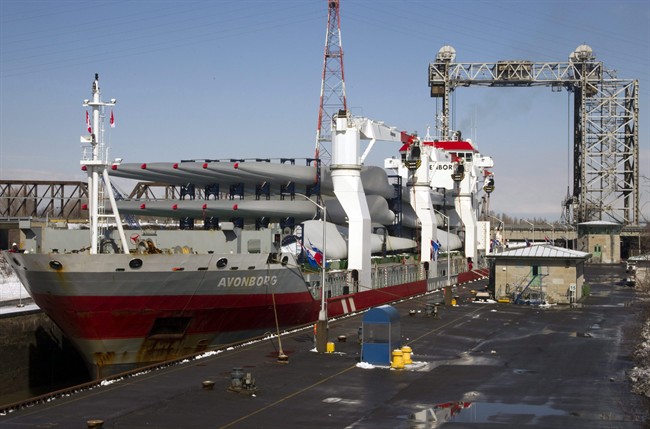MONTREAL – Negotiators have averted a strike on the St. Lawrence Seaway, a labour disruption that could have crippled one of North America’s busiest shipping routes.

The tentative agreement was reached ahead of a noon strike deadline on Monday and after the union gave its 72-hour strike notice on Friday.
The Canadian Auto Workers union says it turned back key concession demands by the St. Lawrence Seaway Management Corp. and is unanimously recommending members approve the three-year agreements negotiated on behalf of several locals.
“We’ve negotiated economic improvements as well as improvements to other structural sections of the collective agreement,” CAW national representative Mike Menicanin said in an interview.
And, he said, management backed down from demands concerning pension plans for new hires and health premiums.
It wanted new hires to be subject to defined contribution rather than defined benefit pension plans. It also initially demanded workers pay a portion of health premiums that would have cost the average worker $170 per month, Menicanin said.
Terms of the collective agreements will be disclosed after workers vote on them in the coming 10 to 12 days.

Get daily National news
Terence Bowles, president and CEO of St. Lawrence Seaway Management Corp., said the deal “will allow ships to continue transiting the waterway without interruption.”
The private, not-for-profit company had said Friday that the seaway would be closed to all traffic in the event of a strike.
The seaway allows large freighters to travel between the Atlantic Ocean and the five Great Lakes, serving some of the most important industrial cities in Canada and the United States and providing a route for the export of grain and other commodities.
But the seaway is also highly sensitive to competition from numerous other transportation options, including the trucking industry and various ports on the East Coast.
The management company is responsible for the movement of marine traffic through the Canadian seaway facilities, which include 13 of the 15 locks that lift and lower ships between Montreal and Lake Erie.
In Ottawa, Labour Minister Lisa Raitt applauded the tentative agreement that averted the seaway’s first strike in 43 years.
“Negotiated agreements are in the best interest of the organization, employees, businesses and the Canadian economy,” she said in a new release.
With the global economy still being very fragile, she said the government was committed to protecting Canada’s economy and Canadian jobs.
Earlier this year, Raitt threatened back to work legislation involving disputes with two unions at Air Canada and legislated striking Canada Post employees back to work citing the negative impact of strikes on the country’s fragile economy.
After Friday’s strike vote, she again cited concerns for the country’s fragile economy but never threatened any specific action, including back to work legislation, a spokeswoman for the minister said.
“There wasn’t any intervention from the minister. The minister continued to encourage the parties to get an agreement and they came to a tentative agreement,” Ashley Kelahear said in an interview.
But the union said it was “flabbergasted” by the “bombs” dropped by the minister, but noted they had no impact on negotiations or the deal reached.
“Once we got over this unwanted complication, we got back to the task at hand and that was try and settle a contract, which we have been doing quite successfully for over 40 years without the help of the minister of labour,” Menicanin said.
The CAW represents 475 supervisory, operations, maintenance and headquarters workers at the corporation in Ontario and Quebec.
The two sides began negotiating three collective agreements in May and the latest round of negotiations began Sept. 19.







Comments